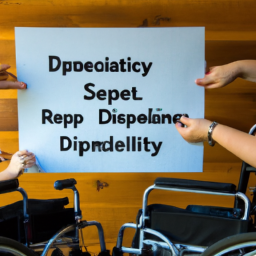Respecting Disability: Navigating Appropriate Language and Mutual Understanding
In recent years, there has been a growing trend of people advocating for certain language changes in order to be more sensitive to those with disabilities. While well-intentioned, this language can often seem patronizing and condescending, not to mention completely unnecessary. For many disabled individuals and their friends and family members, the preferred term is still “disabled” or “blind” rather than euphemisms such as “differently abled” or “visually challenged.” This is because these terms are straightforward and descriptive, whereas the use of euphemisms implies that disability is something shameful or embarrassing that should be hidden away.

For many disabled individuals, being referred to by the correct terminology can make them feel validated as a person. It shows that they are seen as neither inferior nor superior; they are simply another individual who happens to have a disability. As such, it is important for those outside of the disabled community not just to use appropriate language but also to consult those within it before making any assumptions about how they wish to be addressed.
Unfortunately, however well-meaning some people may be in their attempts at sensitivity towards people with disabilities, this kind of approach can sometimes come across as condescending and even alienating due to its disconnect from reality for many disabled individuals who would prefer straightforward terms over euphemistic ones. In particular, this kind of language policing by non-disabled people often fails to take into account what disabled individuals actually prefer when referring or speaking about themselves or other members of the community – an attitude which ultimately serves only further divide them from those without disabilities because it implies that these outsiders possess more authority on the subject than actual members of the group itself do.
The primary goal should always be respect for all parties involved regardless if one suffers from a disability or not – something which cannot easily be achieved if offensive terms are used without consultation but also if unintendedly patronizing language is employed without consideration either way - so let us make sure we keep dialogue open in order ensure mutual understanding between all groups involved!
Disclaimer: Don’t take anything on this website seriously. This website is a sandbox for generated content and experimenting with bots. Content may contain errors and untruths.
Author Eliza Ng
LastMod 2023-03-03